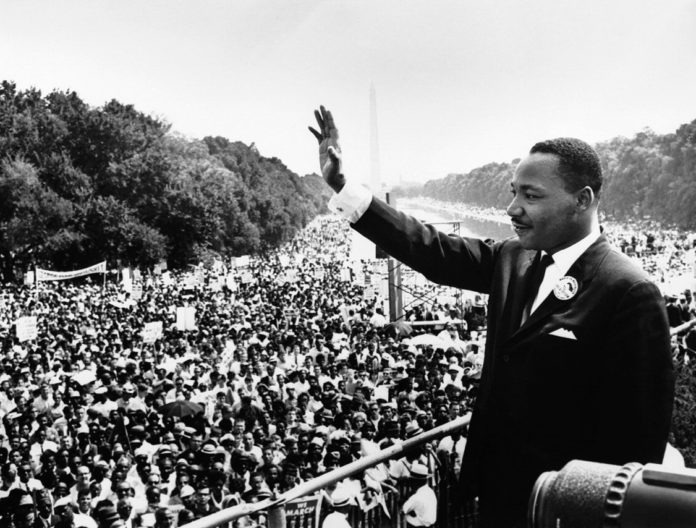Pomezia (NEV), April 24, 2022 – Last night the round table on “Churches and world views: ‘The arc of the moral universe is long but inclines towards justice’ (Martin Luther King) “. They intervened Alessandro Portelli, Igiaba Scego, Raffaele Volpe, Silvia Rapisarda. He moderated the meeting Alberto Annarilli. The meeting took place in the context of the 46th General Assembly of the Baptist Evangelical Christian Union of Italy (UCEBI), in progress in Pomezia (Rome) until 25 April.
At the bottom of the page, the full video of the meeting, from the YouTube page of the Baptist Union.
I choose. Look for ways of decolonization
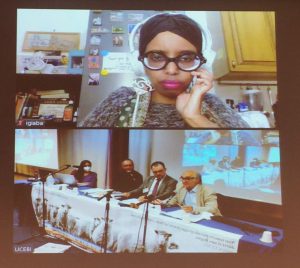 The writer Igiaba Scego has drawn an overview of the situation of migrants, which is always precarious, in the impossibility of taking root in the country that is chosen. Among all the missing laws, that of citizenship. “It is tiring to go back to the same slogans – she said Scego -, but the fight is always the same and the wall is always the same”. Scego outlined the problem of justice. Without justice, according to the writer, there is no room for a plural country. “We ask Africa for resources, but we do not want Africans” Scego again denounces, underlining the contradictions and imbalances that still prevent the cultural construction of “decolonial” paths. We need to “build an equal dialogue with Africa, not just as a country of resources”. Some progress has been made in literature, but “there are still issues on the table that we should have resolved 10/15 years ago. Thus the country remains immobile ”. Speaking of the humanitarian corridors that also involve Baptist churches, in particular through the Mediterranean Hope (MH) program of the Federation of Evangelical Churches in Italy (FCEI) to which UCEBI adheres, Scego said: “The theme of the journey touches me , even as the daughter of refugees. Over the years I have seen the journey deteriorate. In the 90s people still came by plane, then the traffickers arrived. The dead remain hidden, the numbers have disappeared, we do not know. For this you need empathy and emotionality. Creating synergies between the past and the contemporary helps to understand the mechanisms of travel and to let people enter history “.
The writer Igiaba Scego has drawn an overview of the situation of migrants, which is always precarious, in the impossibility of taking root in the country that is chosen. Among all the missing laws, that of citizenship. “It is tiring to go back to the same slogans – she said Scego -, but the fight is always the same and the wall is always the same”. Scego outlined the problem of justice. Without justice, according to the writer, there is no room for a plural country. “We ask Africa for resources, but we do not want Africans” Scego again denounces, underlining the contradictions and imbalances that still prevent the cultural construction of “decolonial” paths. We need to “build an equal dialogue with Africa, not just as a country of resources”. Some progress has been made in literature, but “there are still issues on the table that we should have resolved 10/15 years ago. Thus the country remains immobile ”. Speaking of the humanitarian corridors that also involve Baptist churches, in particular through the Mediterranean Hope (MH) program of the Federation of Evangelical Churches in Italy (FCEI) to which UCEBI adheres, Scego said: “The theme of the journey touches me , even as the daughter of refugees. Over the years I have seen the journey deteriorate. In the 90s people still came by plane, then the traffickers arrived. The dead remain hidden, the numbers have disappeared, we do not know. For this you need empathy and emotionality. Creating synergies between the past and the contemporary helps to understand the mechanisms of travel and to let people enter history “.
Hatches. Get out of the monopoly of violence
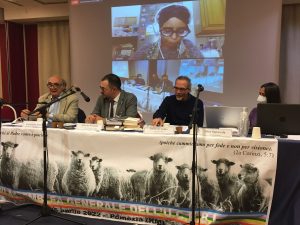 Alessandro Portelli, professor and oral tradition expert, retraced some events ranging from rural churches to citizenship schools in the United States of America, passing through the Highlander Folk School where, years ago, during a visit, he heard the sentence: “There is Rosa Parks on the telephone”. About Rosa Parks, Portelli explained, we have always been told the story of a weak old woman who had pain in her feet and who decided to stay seated on a bus, in a place reserved for whites. “No. She was not a weak old lady. She was in her 40s, secretary of the National Association for the Advancement of Colored People (NAACP). Some people are used to thinking that the oppressed have passions and emotions, but what we rarely attribute to them is intelligence. Instead, this is an exemplary gesture, full of tactics and political militancy. Rosa Parks is chosen to do this organized act- And, two days later, the whole black community boycotted the buses with the consequences we know. It is a movement that knows how to do politics starting from its own body ”. Portelli then traced a brief history of the spiritual “Wes hall overcome”, and then went into the themes of religious singing, “made to be sung together. Here you recognize what it means ecclesia. In the United States, when they say church (church), they mean the people inside, not the place or the institution. Music creates collectivity and has always been an instrument of resistance. As he says Giovanna Marini, there is an inseparability between ritual and function in popular music ”. This dimension, the professor said, today exists almost exclusively in religious spaces. And then, there is an intertwining with class issues: “In the great trade union struggles of the 1930s, with the miners’ struggle movements, the most militant were preachers. During the week the pastor was in the mine, on Sundays he preached in church. They were proletarian churches. And in those wooden churches that are formed Aretha Franklin, Jerry Lee Lewis it’s the same Elvis Presley. They are churches where the fervor, devotion and body language formed in those spaces lead to rock music “. Thus history is intertwined with music, and subjectivities with the community: “The civil rights movement is the irruption into history of subjects denied until then”. A warning against violence, whose monopoly, Portelli concluded, “is not only American, where there are laws that prohibit teaching African American history so as not to upset white children. These are roads that prevent freedom and from which we must leave ”.
Alessandro Portelli, professor and oral tradition expert, retraced some events ranging from rural churches to citizenship schools in the United States of America, passing through the Highlander Folk School where, years ago, during a visit, he heard the sentence: “There is Rosa Parks on the telephone”. About Rosa Parks, Portelli explained, we have always been told the story of a weak old woman who had pain in her feet and who decided to stay seated on a bus, in a place reserved for whites. “No. She was not a weak old lady. She was in her 40s, secretary of the National Association for the Advancement of Colored People (NAACP). Some people are used to thinking that the oppressed have passions and emotions, but what we rarely attribute to them is intelligence. Instead, this is an exemplary gesture, full of tactics and political militancy. Rosa Parks is chosen to do this organized act- And, two days later, the whole black community boycotted the buses with the consequences we know. It is a movement that knows how to do politics starting from its own body ”. Portelli then traced a brief history of the spiritual “Wes hall overcome”, and then went into the themes of religious singing, “made to be sung together. Here you recognize what it means ecclesia. In the United States, when they say church (church), they mean the people inside, not the place or the institution. Music creates collectivity and has always been an instrument of resistance. As he says Giovanna Marini, there is an inseparability between ritual and function in popular music ”. This dimension, the professor said, today exists almost exclusively in religious spaces. And then, there is an intertwining with class issues: “In the great trade union struggles of the 1930s, with the miners’ struggle movements, the most militant were preachers. During the week the pastor was in the mine, on Sundays he preached in church. They were proletarian churches. And in those wooden churches that are formed Aretha Franklin, Jerry Lee Lewis it’s the same Elvis Presley. They are churches where the fervor, devotion and body language formed in those spaces lead to rock music “. Thus history is intertwined with music, and subjectivities with the community: “The civil rights movement is the irruption into history of subjects denied until then”. A warning against violence, whose monopoly, Portelli concluded, “is not only American, where there are laws that prohibit teaching African American history so as not to upset white children. These are roads that prevent freedom and from which we must leave ”.
Rapisarda. Are we awake or are we sleeping?
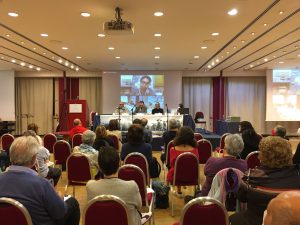 The Baptist pastor Silvia Rapisarda spoke about Martin Luther King, his history and how in the Baptist world you learn to know him from an early age. In her education, however, Rapisarda also grasped a more radical aspect of Afro-American history, through the text “Black theology, black power” by James Cone. The theme of the round table is inspired by King’s phrase about the long arc of the moral universe that leans towards justice. It is an evocation that King uses several times, the pastor said: “We have to go back to a speech from ’57, which better explains the context. King speaks in Berkeley at the YMCA and explains his active non-violent choice against racism and violated rights. She says ‘I am very aware that there are people who believe in nonviolence and do not believe in a personal God, but anyone who believes in nonviolence believes that the universe in some form is on the side of justice’. And again: ‘in Montgomery we felt, while we were fighting, a cosmic company’. King and the African people felt, were, on the right side of history and of cosmic power ”. King’s language, according to Rapisarda, is secular, it reaches everyone, but his conviction is rooted in an eschatological, biblical faith, which comes from the history of the African-American people and which comes from theology and resistance. It is, says the pastor, a dimension of faith. “But who does it depend on? With us? From God? Even today in our churches we have a faith that lingers in the vertical dimension and in the horizontal dimension. Earth and sky, time and eternity. Dimensions that integrate, as King argues, man as a human being and God, the human being with the human being. And every being with itself “. Rapisarda, taking up King’s teaching, also reflects on the fact that religion risks being dry as dust if it looks to the salvation of one’s soul without seeing the weak and oppressed.
The Baptist pastor Silvia Rapisarda spoke about Martin Luther King, his history and how in the Baptist world you learn to know him from an early age. In her education, however, Rapisarda also grasped a more radical aspect of Afro-American history, through the text “Black theology, black power” by James Cone. The theme of the round table is inspired by King’s phrase about the long arc of the moral universe that leans towards justice. It is an evocation that King uses several times, the pastor said: “We have to go back to a speech from ’57, which better explains the context. King speaks in Berkeley at the YMCA and explains his active non-violent choice against racism and violated rights. She says ‘I am very aware that there are people who believe in nonviolence and do not believe in a personal God, but anyone who believes in nonviolence believes that the universe in some form is on the side of justice’. And again: ‘in Montgomery we felt, while we were fighting, a cosmic company’. King and the African people felt, were, on the right side of history and of cosmic power ”. King’s language, according to Rapisarda, is secular, it reaches everyone, but his conviction is rooted in an eschatological, biblical faith, which comes from the history of the African-American people and which comes from theology and resistance. It is, says the pastor, a dimension of faith. “But who does it depend on? With us? From God? Even today in our churches we have a faith that lingers in the vertical dimension and in the horizontal dimension. Earth and sky, time and eternity. Dimensions that integrate, as King argues, man as a human being and God, the human being with the human being. And every being with itself “. Rapisarda, taking up King’s teaching, also reflects on the fact that religion risks being dry as dust if it looks to the salvation of one’s soul without seeing the weak and oppressed.
Martin Luther King, concludes the pastor, “was able to give a strong sense of vocation, in terms of corporate identity. King believed in the role of the African American people, which is why he called them children of God, children of God, convinced that God had given them the vocation to free America from the sin of racism. And he intended to demonstrate to the whole world the efficacy of nonviolence as a concrete manifestation of biblical love. Do we still have such a corporate identity? Maybe not, because we are post-modern, post-Christian, fluid, and it’s impossible. Yet the path of King and the African-American people is part of our imaginative memory, which feeds hope. In light of this, the question: are we awake or are we sleeping? “
Fox. Hope, vision, action
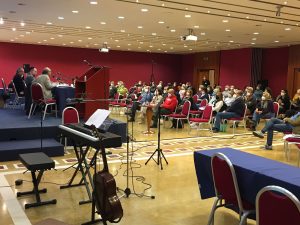 Raffaele Volpe, Secretary of the Department of International Churches, spoke of hope, vision and action combined with the spirituality of change, suffering and community. His research work on Martin Luther King was based on how the Nobel Peace Prize Baptist pastor talks about civil rights. These are the words used by King: “spiritual movement, spiritual explosion, spiritually rooted movement, movement that depends on moral and spiritual forces, the burning spirit of this new age”. A rhetoric, according to Volpe, to be studied. “An African proverb says: ‘I am because we are’. Desmond Tutu also said ‘I am as I am, thanks to the way we are’. We must build communities through individuals who do not imagine themselves, rediscovering the question of education, with a new biblical literacy ”says Volpe. Action is combined with the community: “The point is to take care of the development of our person, of our relationships with others and our relationship with God. Let’s see King’s sermons on broken dreams: ‘there is perhaps one of us who has not faced the agony? ‘”. We can pass, says the pastor, from a widespread cynicism of a lost hope, to the rediscovery of the close connection between hope and the power of change, between loss of hope and fatalism. “Losing responsibility towards society – concludes Volpe – empties the sense of democracy. Let us accept failures, but let us remember that there is infinite hope, the shrill Christian testimony that God is capable, powerful. Recovering a spirituality of sacrifice. God’s power for social and individual salvation also passes through suffering (his and his people’s suffering) ”.
Raffaele Volpe, Secretary of the Department of International Churches, spoke of hope, vision and action combined with the spirituality of change, suffering and community. His research work on Martin Luther King was based on how the Nobel Peace Prize Baptist pastor talks about civil rights. These are the words used by King: “spiritual movement, spiritual explosion, spiritually rooted movement, movement that depends on moral and spiritual forces, the burning spirit of this new age”. A rhetoric, according to Volpe, to be studied. “An African proverb says: ‘I am because we are’. Desmond Tutu also said ‘I am as I am, thanks to the way we are’. We must build communities through individuals who do not imagine themselves, rediscovering the question of education, with a new biblical literacy ”says Volpe. Action is combined with the community: “The point is to take care of the development of our person, of our relationships with others and our relationship with God. Let’s see King’s sermons on broken dreams: ‘there is perhaps one of us who has not faced the agony? ‘”. We can pass, says the pastor, from a widespread cynicism of a lost hope, to the rediscovery of the close connection between hope and the power of change, between loss of hope and fatalism. “Losing responsibility towards society – concludes Volpe – empties the sense of democracy. Let us accept failures, but let us remember that there is infinite hope, the shrill Christian testimony that God is capable, powerful. Recovering a spirituality of sacrifice. God’s power for social and individual salvation also passes through suffering (his and his people’s suffering) ”.
46th Baptist Assembly. M.Luther King, black power, justice, spirituality

